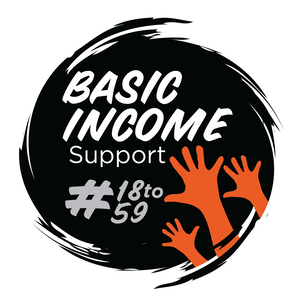The COVID-19 pandemic is a global economic and humanitarian crisis. South Africa’s already dire economic situation, with the triple challenges of systemic poverty, unemployment and inequality, has become bleaker. The national lockdown has exacerbated structural unemployment, led to increased food prices and placed an immense strain on household resources. The pandemic has compounded food insecurity and hunger is widespread. Almost half of the population is chronically poor. For the foreseeable future, the economy in its current configuration will not absorb all the unemployed.
Section 27 of the Bill of Rights in the South African Constitution makes provision for Social Security, “including appropriate social assistance if they are unable to support themselves” [2]. Income support in the form of social grants is provided to approximately 18 million of the most vulnerable: the elderly, children and people with disabilities. However, able-bodied people aged 18 to 59 with no or little income are excluded from the social assistance grants.
The South African government must uphold the United Nations, International Covenant of Economic, Social and Cultural Rights [3], which it ratified. The Covenant forms the cornerstone of international human rights law. Key recommendations made are that the South African government “ensure that those between the ages of 18 and 59 with little or no income have access to social assistance; consider the possibility of introducing a universal basic income grant”; and “raise the level of government social assistance benefits to a level ensure an adequate standard of living for recipients and their families”.
The government’s Social Relief of Distress package introduced a monthly R350 COVID-19 Social Relief of Distress (SRD) grant for six-months for the unemployed, and CSG increase of R500 to be given per caregiver monthly for five months until October 2020. While most grants benefitted from a monthly top-up of R250 for six months, the Child Support Grant was increased by R300 for the month of May only, and then only given per caregiver.
Both new social grants are inadequate to cover basic food, energy sources and transport, as well as the additional cost of complying with hygiene protocols during the pandemic. The cost of the monthly basket of staple foods has increased by 6% to R3 413,14 for the period March to July 2020 for the average household. Furthermore, the online platform for applications and dated verifying databases continue to result in serious access challenges for those eligible for the COVID-19 SRD grant.
Income support for those aged 18 to 59 with no or little income is a critical step towards the government’s implementation of a universal basic income grant to ensure that all who live in South Africa have an adequate standard of living.
The following organisations endorse this campaign:
Act Ubumbano, Ahmed Kathrada Foundataion, Albert Luthuli Human Rights Advice Centre, Alternative Information and Development Centre, Archdiocese of Durban Justice and Peace Commission, Beaufort West Advice Office, Bench Marks Foundation, Bertha Centre for Social Innovation and Entrepreneurship Graduate School of Business, Bohlabela Advice Centre, Botshabelo Unemployment Movement, Cancer Alliance, Cash Transfers Working Group of the C19 Peoples Coalition, Centre for Applied Legal Studies, Children in Distress (CINDI), Community Advice Offices South Africa (CAOSA), Consortium for Refugees and Migrants in South Africa (CoRMSA), Congress of South African Trade Unions, Cooperative and Policy Alternative Centre (COPAC), Democracy Development Program, Dirang Ka Kagiso ( Community Home Based Care), Dirang Ka Kagiso ( Wellness Center), Dullah Omar Institute, Environmental Monitoring Group, Equal Education, Heidelberg Advice Office, Hillcrest Aids Centre Trust, Institute for Economic Justice, Institute for Poverty, Land and Agrarian Studies at the University of the Western Cape, Interchurch Local Development Agency, International Labour Research and Information Group (ILRIG), Jersey Farm Advice and Information Centre, Ketekani Community Project, Kgothatsanang organisation, Khutsong Youth Friendly Services, Advice Center, Kwafene Advice office, Lawyers For Human Rights, Legal Resources Centre, Mariann Coordinating Committee (MCC), Matlosana Development Forum, Middelburg Development and Advice Office, Muslim Judicial Council, Ndifuna Ukwazi, Open Secrets, Organised for Work, Probono.org, People's Health Movement, Public Affairs Research Institute (PARI), Public Service Accountability Monitor (PSAM), Right2Know, Scalabrini, Riversdale Advice and Community Development Agency, Section 27, Sexual and Reproductive Justice Coalition (SRJC), Shayisfuba Feminist Collective, Sisterhood Movement, Social Change Assistance Trust (SCAT), Social Justice Coalition, Social Work Action Network South Africa, South African Domestic Services and Allied Workers Union (SADSAWU), South African Food Sovereignty Campaign, South African NGO Coalition (SANGOCO), Southern African Social Policy Research Institute, Standerton Victim Empowerment and Advice Office, Studies in Poverty and Inequality Institute (SPII), Ubuntu Rural Women and Youth Movement, Triangle Project, Western Cape Forum For Intellectual Disability, Women Hope for the Nation, Women on Farms Project, amandla.mobi, Vianney Child and Youth Care Centre, Women's Legal Centre, Workers World Media Productions (WWMP), Zenzeleni Project
[1] Cost of household food basket rising, ENCA June 2020
[2]
https://www.justice.gov.za/legislation/constitution/SAConstitution-web-eng-02.pdf[3]
https://www.ohchr.org/en/professionalinterest/pages/cescr.aspx.png)
